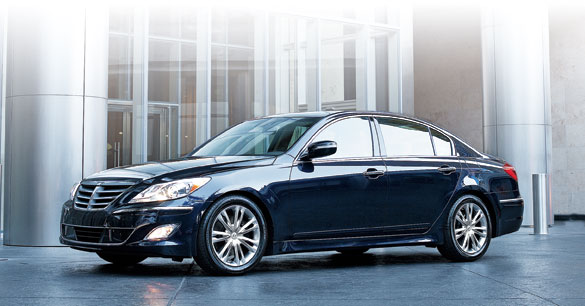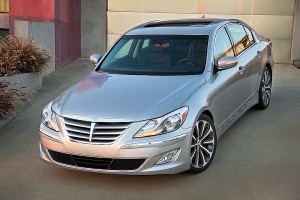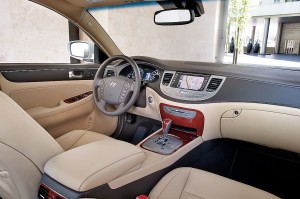Luxury comes into being | The 2012 Hyundai Genesis
By Marc Schulhof
April 2012 View more For The Road
 Photos courtesy of Hyundai Motor Company.
Photos courtesy of Hyundai Motor Company.
How can a car company known for building affordable, dependable transportation expect buyers to line up for a luxury model—even one that is bargain-priced compared to its competition?
Twenty-some years ago, that was the question people were asking about Toyota, which had just rolled out its first Lexus model. Heads were scratched. Test drives were taken. And then: Wallets were opened—and that strange and untested new name steadily earned its cachet.
 Today, we are witnessing another car company take a page from a very similar playbook: The 2012 Hyundai Genesis 5.0 R-Spec is a luxury sedan that delivers the goods just as well as its more established rivals, but at an unrivaled price. (Think about how many Hyundai Sonatas you see on the road, and you can guess that Hyundai took the same approach to grabbing sales from the Honda Accord.)
Today, we are witnessing another car company take a page from a very similar playbook: The 2012 Hyundai Genesis 5.0 R-Spec is a luxury sedan that delivers the goods just as well as its more established rivals, but at an unrivaled price. (Think about how many Hyundai Sonatas you see on the road, and you can guess that Hyundai took the same approach to grabbing sales from the Honda Accord.)
Though it does not have a hood ornament that bespeaks privilege (actually, it does not have a hood ornament at all), the Genesis is a delightful conveyance—smooth and quiet, powerful and balanced—and certainly feels like a luxury car, regardless of what the nameplate says.
If looks were everything, the Genesis might already have the game wrapped up. This is a clean, crisp sedan—neither too showy nor too anonymous. Is its design game-changing? No. But then, luxury car buyers have shown over the years that they generally favor established lines.
Outside and in, the Genesis does a terrific imitation of the Mercedes E-Class and Lexus GS—cars that cost at least $10,000 more. It matches those standard-bearers in terms of quantitative (leg room, shoulder room, and so on) and qualitative (things like seat comfort, the feel of the cabin materials, and the sound of the stereo) qualities. In other words, driving the Genesis requires neither apologies nor excuses.
The Genesis is also comparable to those Mercedes and Lexus models in terms of its engine and performance. The basic Genesis finds its motivation with a big 3.8-liter V6. Upgrading to the top-of-the-line R-Spec means swapping the V6 for a 5.0-liter V8, and trading in a pleasant 333 horsepower for a bracing 429. (As if those choices were not enough, Hyundai also offers a 4.6-liter version of the V8 that splits the difference at 378 horsepower.)
Regardless of the engine you choose, it’s the Genesis’ rear wheels that are doing the driving—and an eight-speed automatic transmission making the connection.
 The Genesis 5.0 R-Spec boasts not only range-topping power (and a reported 0-to-60 time of about five seconds), but also bigger brakes and wheels, and a suspension tuned for more hijinks than the average luxury buyer might choose to perform. If your driving style tends toward the sedate, then the 5.0 model (same big engine, but more comfort-oriented suspension) might be the better choice.
The Genesis 5.0 R-Spec boasts not only range-topping power (and a reported 0-to-60 time of about five seconds), but also bigger brakes and wheels, and a suspension tuned for more hijinks than the average luxury buyer might choose to perform. If your driving style tends toward the sedate, then the 5.0 model (same big engine, but more comfort-oriented suspension) might be the better choice.
“Bargain” is a relative term, of course, but the 2012 Hyundai Genesis delivers a lot for its price. The V6 model starts at $34,200, the V8 models start at $44,500, and the R-Spec’s sticker reads $46,500.
The price spread between the various Genesis models, like that between V6- and V8-powered Mercedes models, owes a lot to the engine, but also to each car’s level of standard equipment. The R-Spec, for example, comes pre-loaded with leather seats, a lane-departure warning system, front and rear parking sensors, rain-sensing windshield wipers, and the like. Virtually the only things left for the option list are performance tires ($1,400) and an iPod cable ($35).
The Lexus LS 460—heir to the first Lexus LS model back in 1989—has shown remarkable staying power. The Hyundai Genesis may well do the same. In the meantime, the Genesis is backed by a 10-year powertrain warranty (like other Hyundais), which should assuage any lingering concerns that buyers may have about lower price signaling lower quality.


